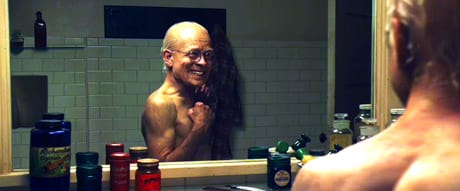Nominated for 13 Academy Awards, The Curious Case of Benjamin Button took home Oscars for Art Direction, Makeup and Visual Effects, and deserved every one of them. But David Fincher's adaptation of F. Scott Fitzgerald's short story missed out on the more coveted categories for a reason: the drama can't quite match the technical wizardry, which features some of the greatest effects in cinematic history. It's surprising considering that the source material the late author left them is so fascinating. Eric Roth (Forrest Gump) wrote the script of a man "born old," as he puts it, who ages in reverse. As a toddler, Benjamin (Brad Pitt) is a shrivelled, decrepit man raised by motherly caregiver Queenie (Taraji P. Henson) in post-WWI New Orleans. At a young age he meets Daisy (played as an adult by Cate Blanchett), the scarlet-haired love of his life and as time goes by the pair strike up a romance. But in between Benjamin lives an extraordinarily contrived life of overcoming obstacles and ignoring his peculiar circumstances. Roth doesn't go so far as establishing his character as a public hero this time around, and instead of giving any scientific explanation for his condition he uses romance as the engine to drive Benjamin's story. It's odd then that such an uplifting "case" doesn't quite have the emotional potency to reel you in all the way. Pitt feels like the easiest scapegoat to pin this on; he portrays this rich character with emotional emptiness and a sensitive disconnect that leaves the heart wondering why it isn't breaking more as Benjamin undergoes such a lonely transformation. Which leaves it in the hands of Fincher, who makes this fairytale come to life purely through his ambitious vision. His meticulous eye for detail is a masterstroke — you never once question that the shrunken geezer isn't the Hollywood super-stud. Pitt does win more respect, however, when you see him covered in facial capture dots with fluorescent green make up or in a restrained position trying to give an 80-year-old version of him the right facial idiosyncrasies. This becomes evident on the revelatory second disc but if you thought the film was drawn out, well, it doesn't compare to the extras. Fincher begins with a heart-wrenching account of how losing his father to pancreatic cancer inspired him and how the script, which originally surfaced back in 1986, came to life. From there, a timeline reveals how it didn't get made by the likes of Frank Oz (couldn't pull it off), Steven Spielberg (got busy with Hook, Schindler's List and Jurassic Park), Ron Howard and Spike Jonze, who wanted to turn it into a "radically different, quirky comedy." Old age tests with various actors are demonstrated, the editor shows the frustrations of dealing with headless characters and a post-production animation crewmember describes how many times he wanted to quit. But it's all so fascinating to watch this movie be made through the "youthenization process," which required a plastic surgeon as a consultant, and limited them to making Pitt either 20 years younger or ten years older. It makes for hours of entertainment — unless you don't want to spoil the grand illusion of Benjamin Button, which these insights can. On top of that Fincher adds a commentary that answers whatever questions are left. He laughs at how the remote control baby made all sorts of weird mechanical noises, mentions how he challenged Pitt to come up with an actress to play Elizabeth Abbott (Tilda Swinton) and at the point where the film takes an obvious dive after its climax (i.e., where Benjamin is no longer Pitt), confronts the bellyachers with the challenge of, "I think you should make that movie." Uh, no thanks.
(Paramount Pictures)The Curious Case of Benjamin Button
David Fincher

BY Cam LindsayPublished May 7, 2009